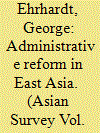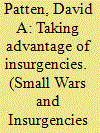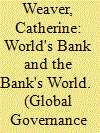| Srl | Item |
| 1 |
ID:
091101


|
|
|
|
|
| Publication |
2009.
|
| Summary/Abstract |
This paper looks at how recent Japanese prime ministers have counterintuitively limited political control over the bureaucracy. It uses conflicts at the foreign and defense ministries to illustrate how the presence of multiple principals alters principal-agent theory and its implications for the politician-bureaucrat relationship. This study integrates the Japanese case into comparative scholarship on Taiwan and Korea.
|
|
|
|
|
|
|
|
|
|
|
|
|
|
|
|
| 2 |
ID:
128584


|
|
|
|
|
| Publication |
2013.
|
| Summary/Abstract |
Taking insurgency sponsorship as an instrument states have available for achieving foreign policy objectives, I consider how state-sponsors could best manipulate their support to maximize control of the proxy group. Building on research that models the state-sponsor-insurgent relationship using a principal-agent framework, I identify two key vulnerabilities to which the state-sponsor is exposed: adverse selection and agency slack. As an original contribution to the literature on state-sponsorship of insurgency, I articulate reasons why certain forms of support would be most conducive to overcoming these problems and illustrate how South Africa and Iran used those kinds of support to influence the behavior of their proxies, RENAMO and Hezbollah. Additionally, I consider how this principal-agent analysis of insurgency sponsorship also could apply when the principal is an international terrorist organization such as al Qaeda. Finally, I address the relevance of these ideas to two contemporary conflicts taking place in Syria and the Congo.
|
|
|
|
|
|
|
|
|
|
|
|
|
|
|
|
| 3 |
ID:
079571


|
|
|
|
|
| Publication |
2007.
|
| Summary/Abstract |
Who or what shapes and drives the policy and operational behavior of the World Bank? The objective of this essay is to lay the conceptual and empirical framework for this special issue. I begin by constructing a synthetic theoretical model-drawing from principal-agent models and sociological institutionalism-to delineate the set of external and internal factors shaping Bank behavior. I then lay the empirical groundwork by exploring the most salient characteristics of the "world's Bank," taking special note of the Bank's relationship with the United States, borrowing states, and nongovernmental organizations. In the second half, I focus on the "Bank's world," investigating the internal bureaucratic politics and culture of the Bank. Specifically, I examine the sources and nature of the Bank's "intellectual culture" (characterized by its economistic, apolitical, and technical rationality), its "operational culture" (portrayed as driven by approval and disbursement imperatives), and the dynamics of bureaucratic politics that pervade the hierarchy of the Bank.
|
|
|
|
|
|
|
|
|
|
|
|
|
|
|
|